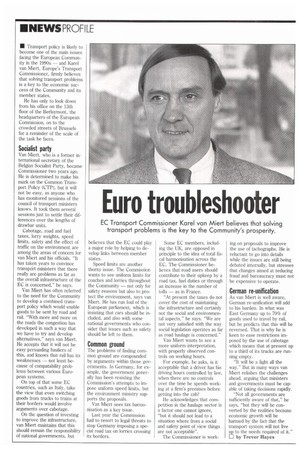• NEWS PROFILE
Page 22

If you've noticed an error in this article please click here to report it so we can fix it.
• Transport policy is likely to become one of the main issues facing the European Community in the 1990s — and Karel van Miert, Europe's Transport Commissioner, firmly believes that solving transport problems is a key to the economic success of the Community and its member states.
He has only to look down from his office on the 13th floor of the Berlaymont, the headquarters of the European Commission, on to the crowded streets of Brussels for a reminder of the scale of the task he faces.
Socialist party Van Miert, who is a former international secretary of the Belgian Socialist Party, became Commissioner two years ago. He is determined to make his mark on the Common Transport Policy (CTP), but it will not be easy, as anyone who has monitored sessions of the council of transport ministers knows. It took them several sessions just to settle their differences over the lengths of drawbar units.
Cabotage, road and fuel taxes, lorry weights, speed limits, safety and the effect of traffic on the environment are among the areas of concern for van Miert and his officials. "It has taken years to convince transport ministers that there really are problems as far as the overall infrastructure of the EC is concerned," he says.
Van Miert has often referred to the need for the Community to develop a combined transport policy which would enable goods to be sent by road and rail. "With more and more on the roads the congestion has developed in such a way that we have to try and develop alternatives," says van Miert. He accepts that it will not be easy persuading hauliers of this, and knows that rail has its weaknesses — not least because of compatability problems between various European systems.
On top of that some EC countries, such as Italy, take the view that even switching goods from trucks to trains at their borders would involve arguments over cabotage.
On the question of investing to improve the infrastructure, van Miert maintains that this should remain the responsibility of national governments, but
































































